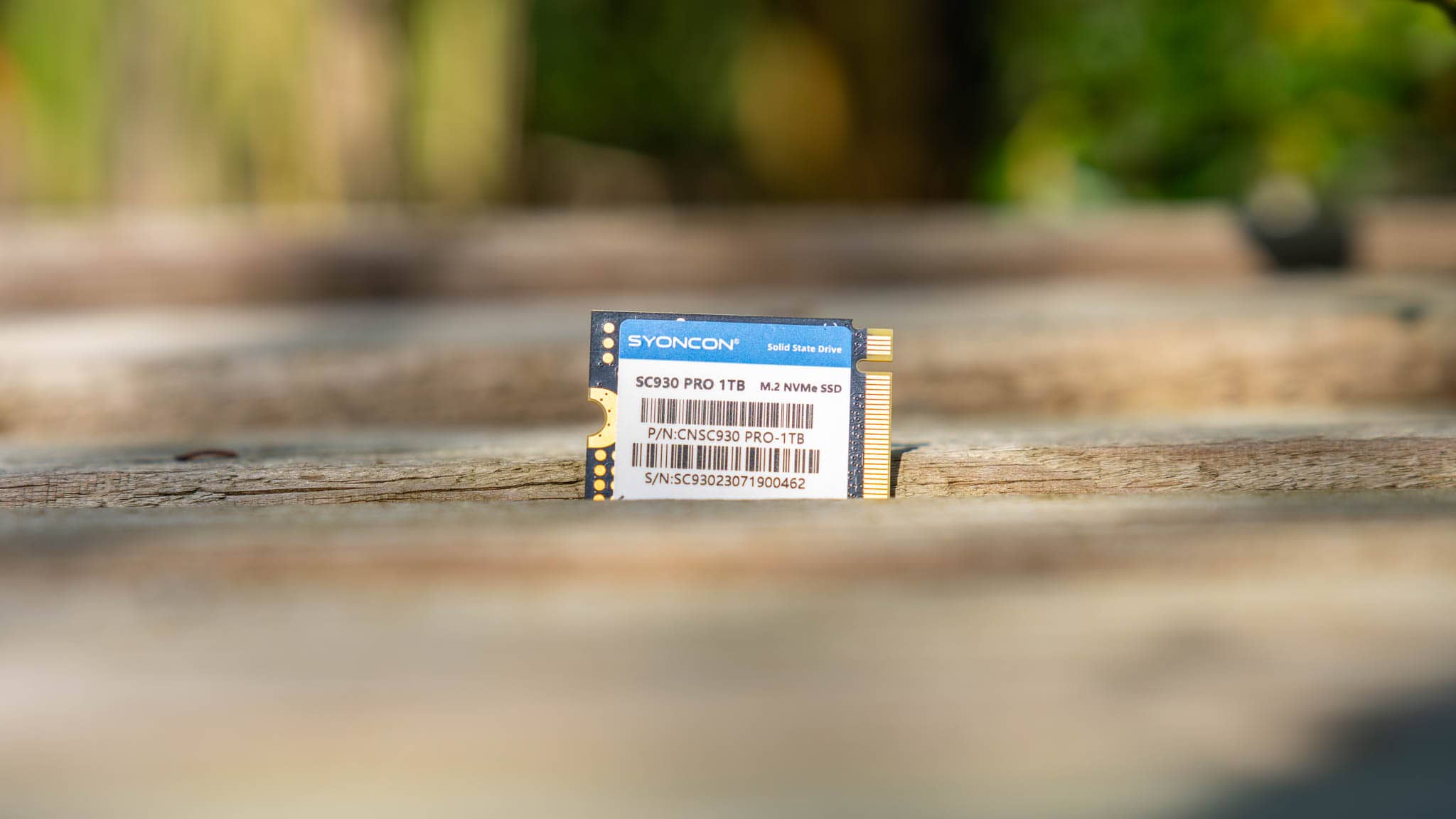Sometimes there are tests that seem routine at first glance. This is also the case with the SYONCON SC930 PRO. However, the test turned out to be very difficult and problematic.
More and more devices are using the smaller 2230 SSD form factor. Very prominently, the Steam Deck, but also, for example, the Framework 16 Notebook, the Microsoft Surface devices, etc.
Unfortunately, the selection of SSDs in the 2230 form factor is manageable. One of the particularly exotic models is the SYONCON SC930 PRO.
The SYONCON SC930 PRO is a 2230 M.2 NVME SSD with 1TB for just under €100.
That wouldn’t be a good price for a large 2280 SSD, but it’s fair for a smaller 2230 SSD.
But here the question naturally arises: how good is the SSD? I suspect that very few people have ever heard of SYONCON, including me before this test.
So let’s take a closer look at the SYONCON SC930 PRO in the test!
Test: SC930 PRO von SYONCON
The important thing about the SC930 PRO is the form factor. So here we have an M.2 NVME SSD, which is only 30 mm long and therefore uses the 2230 form factor.
2230 = 22mm wide and 30mm long. Normal M.2 SSDs use the 2280 form factor, i.e. 22 mm wide and 80 mm long.
This means that the components on the SSD have to be packed much more tightly, which makes them more expensive.
At first glance, the SSD makes a reasonable impression. We have a SYONCON sticker on the back. On the other hand, the chips are freely visible on the top.
Excitingly, the manufacturer includes a small “cover” made of aluminum, which is intended to prevent the SSD from interfering with the WLAN module, for example.
Kind! Because this can otherwise be a problem in the Steam Deck, for example. This cover can also help with heat dissipation.
There are further plus points for the included SSD screw. Unfortunately, this is not a given.
The technology
Things get a bit exotic when it comes to the technology of the SYONCON SC930 PRO. So we basically have a PCIe 4.0 SSD with the following data rates according to the manufacturer:
4950 MB/s read
Write 4400 MB/s
Here comes the controller MaxIO MAP1602A-F3C for use. A super exotic controller that we only find on a few other SSDs, such as the Acer Predator GM7 or TeamGroup MP44.
Here you can find further technical data about the MaxIO MAP1602A:
The controller actually works quite well! Depending on which NAND it is combined with, it is capable of up to 7200 MB/s.
Speaking of NAND, it is labeled “BWN09TC1B30C6C”. Even Google hasn’t heard of this NAND yet.
There is also very little information about NAND on the manufacturer’s website. SYONCON doesn’t even specify whether the SC930 PRO is TLC or QLC.
This is probably NAND from a Chinese manufacturer.
TBW
After all, the TBW value of the 1TB SSD is stated to be quite high at 788 TB.
Of course, this doesn’t necessarily mean anything, but it’s still a small plus point and could possibly be seen as a sign that the manufacturer believes in its SSD.
The problems with the SYONCON SC930 PRO!
The SYONCON SC930 PRO shows behavior in my test PC that I have never observed with any SSD before!
AMD Ryzen 5 7600X
ASUS ROG Strix X670E-E
16GB DDR5 RAM
Windows 11 Pro 22H2
At first the SSD worked absolutely perfectly! A first run of CrystalDiskMark also shows promising values.
The SC930 Pro achieved a reading speed of 4949 MB/s and a writing speed of 4410 MB/s. More than decent values for such an SSD!
But after that it gets adventurous!
Because AS SSD, PC Mark, 3D Mark and WinRAR refuse to work with the SSD!
Either the programs hang (or the entire PC) or they stop with an error message.
After this error message occurs, even Windows refuses to format the SSD.
What have I tried?
BIOS updated to the latest version. SSD “reset” and repartitioned etc. Tried other slots on the motherboard.
But no, the problem remains! I’ve never seen anything like this happen with an SSD.
Also problems in the Geekom AS6
To rule out that this is a bug with my primary test PC, I installed the SSD in my Geekom AS6 (AMD Ryzen).
Unfortunately, there were similar problems and behavioral problems here too.
Everything works externally!
A possible thought might be, “the SSD will simply be broken”. But no, I think the SSD is fine!
The SSD works perfectly in an external SSD case!
This also tells me that the SSD uses TLC NAND, because after the write cache it still has a data rate of around 370 MB/s, which speaks for TLC NAND.
Conclusion
Unfortunately, I can’t give a real conclusion about the SYONCON SC930 PRO. I had massive problems with the SSD, which I have never seen before. Possible reasons:
An incompatibility with my two AMD systems A half-defective SSD Incompetence of the tester (never 100% ruled out)
In principle the SSD worked enough that I was able to get some values. The SSD achieved 4949 MB/s reading and 4410 MB/s writing. Good values! We also have TLC NAND with around 370 MB/s after cache.
More than reasonable values for a 2230 SSD! If the other tests had also been so positive, I would have recommended the SSD.
So I’m having a hard time. Since the SSD worked without any problems in external housings for me, I don’t assume it’s a (complete) defect.
Maybe we have a stupid incompatibility here? Or maybe a partially defective SSD?
